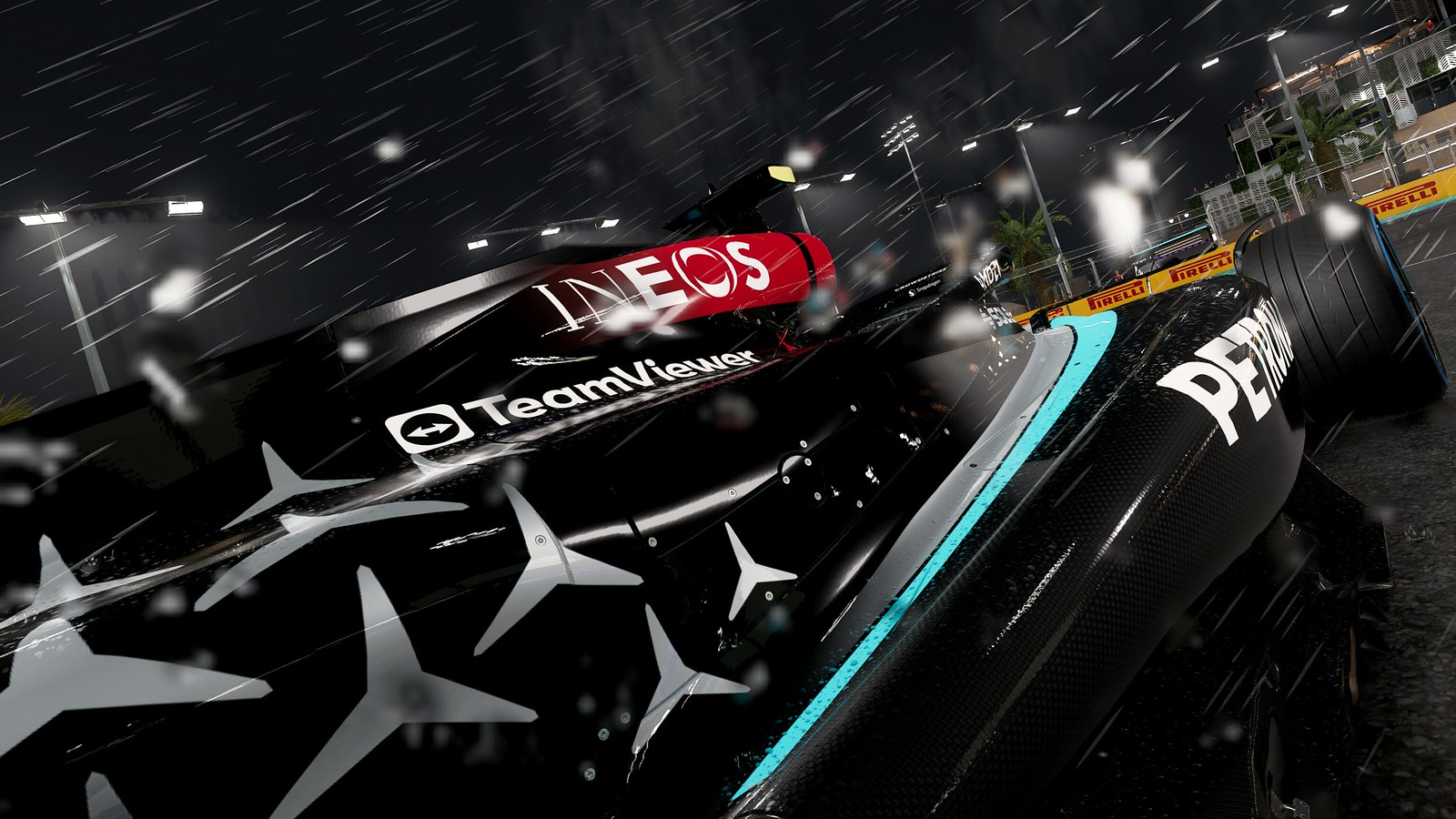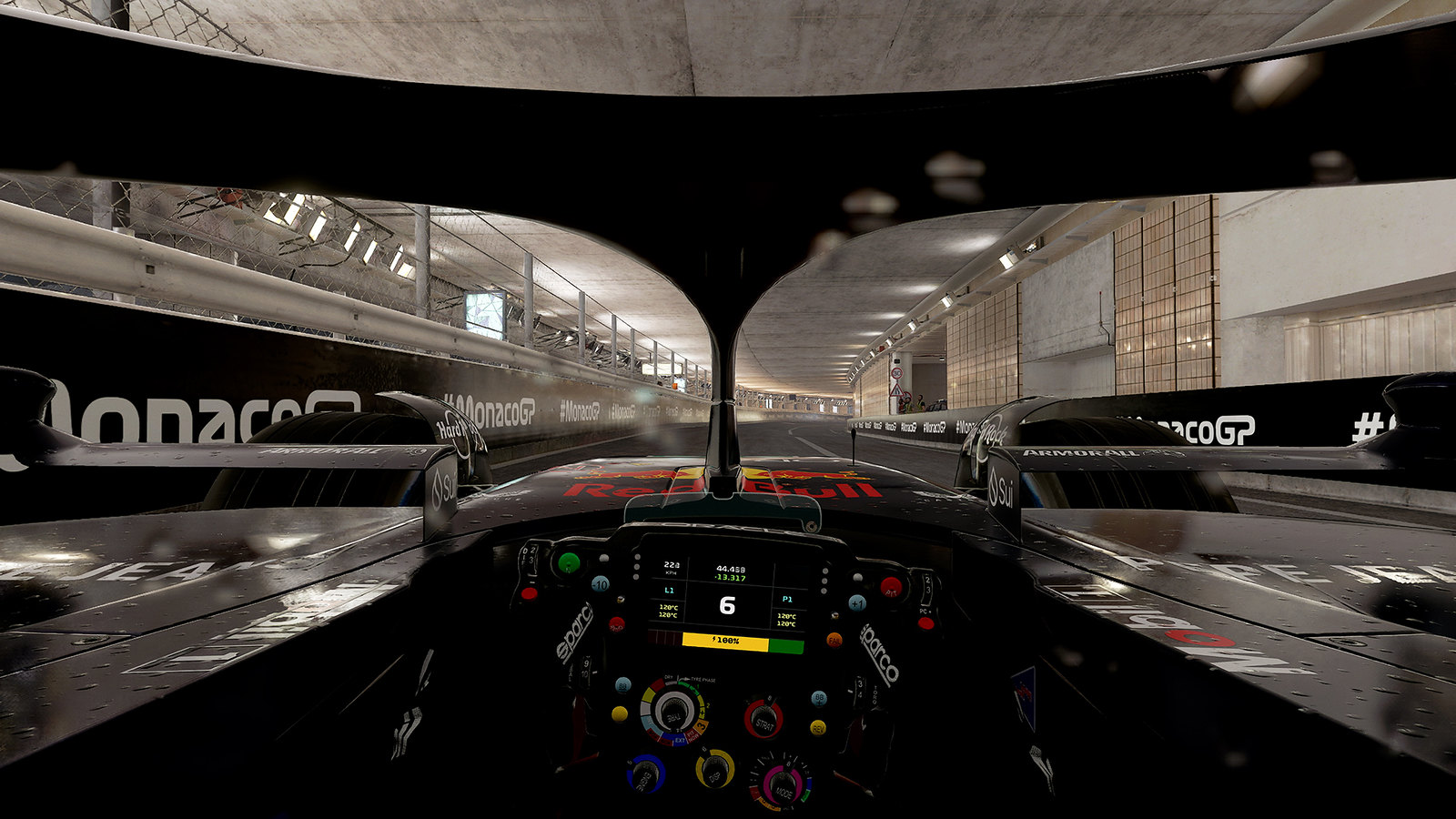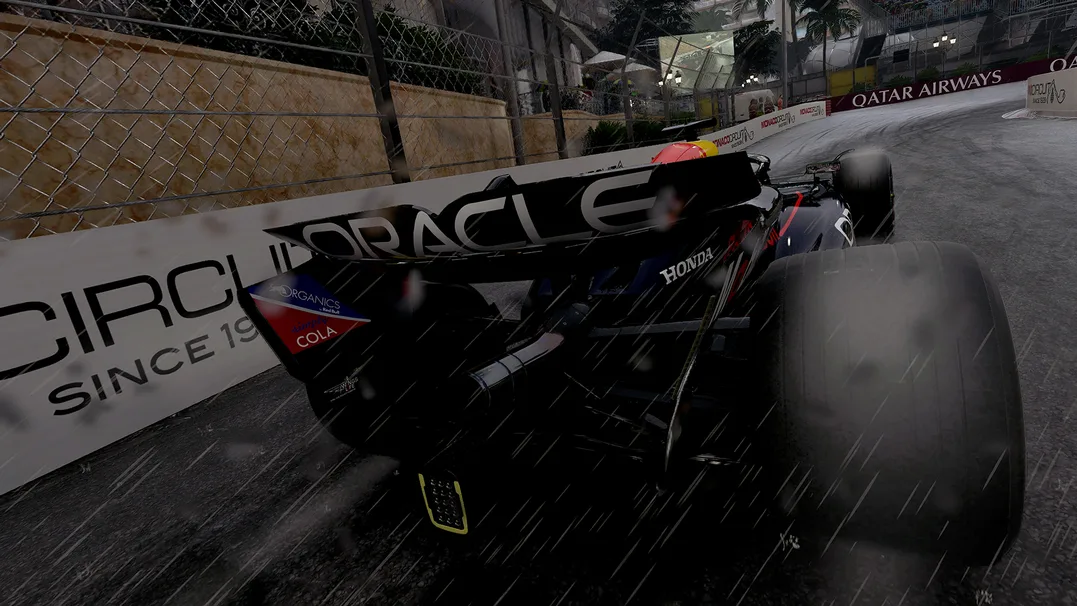EA Sports F1 24 might just be a perfect showcase for the power of the PlayStation 5 Pro. Developer Codemasters has taken one of the best racing games and delivered a PS5 Pro exclusive resolution mode that achieves a stunning 8K at 60fps alongside a wealth of ray-tracing upgrades that enhance everything from the sheen of vehicles to the surfaces of a wet track.
The existing quality mode also gets a massive boost on the console, with PlayStation Spectral Super Resolution (PSSR) powering increased ray tracing while maintaining its 4K 60fps target. Performance mode is smoother than ever on PS5 Pro too, with support for 120Hz displays. I was fortunate enough to go hands-on with the PS5 Pro build on a high-end 8K TV in a full sim racing rig (equipped with one of the best racing wheels) and the improvements are hard to ignore. It’s the kind of performance that would be almost impossible to achieve on the base PS5 and helps take the game’s already great visuals to a whole new level.
All of these PS5 Pro enhancements are available now and were released to coincide with the all-new season four update, which introduces a selection of new challenges and rewards.
Rear-view mirror

With the real-world F1 championship coming to a close next month, EA Sports F1 player-first producer Ross Waters explains that the game’s latest content “is celebrating the end of the season” and is focused on the legacy of past champions. “We have some very exciting events, including the Oscar Piastri Pro Challenge, where you’ll be taking on a lap set on our game by Oscar Piastri, with a chance of winning the Google Chrome 2.0 livery.”
“We also have a number of scenarios,” he continues, “the headline one, in most opinions, is Abu Dhabi 2021 where players will play as Lewis Hamilton and Max Verstappen.” As with past seasons, the intention here is “to give something for everybody and to give players an opportunity to be involved in a sport that’s so fascinating to so many” regardless of ability and how committed players are to the game. This is especially important given the upcoming free-to-play weekend, which will allow newcomers to try the game for free between November 21 and 25.
This could be a fantastic opportunity for PS5 Pro owners to see F1 24’s boosted visuals for themselves. Si Lumb, technical producer on the game’s EGO Engine at Codemasters, says that the launch of the PS5 Pro was “really exciting for us as an engine team” and explains some of the work that went on behind the scenes.
“We have an engine that is continually evolving, we’re always looking at what we can do with future titles and, knowing when the hardware was going to be available, we felt that using 24 as a test bed to see how far we could push our engine […] was a really, really big opportunity,” he adds. “We took a great game like 24, that came out looking great on console running at a lock 60[fps] and said ‘how much of the ray tracing effects that we have developed over time and put into our cut scenes and our front end can we bring to track?’ We brought ray-traced dynamic diffuse global illumination to track at launch and we knew there was a window of opportunity to put more on track with the power of the PS5 Pro.
“One of the things that’s a real challenge in a game is if you’re going to light something and put shadows in, if it’s a moving object it’s very difficult to bake those shadows and to give that illusion of a shadow,” he continues. “What ray-traced ambient occlusion gives us is the ability to give that actual shadow so that was something we added to the scene. That combination of reflections, ambient occlusion, and dynamic, diffuse global illumination, which gives you that soft bounce light in the corners, could realize an image that felt more real the moment we saw it. You turn it on, and it feels correct to the eye. It just sits more naturally. You turn it off, and you’re back in video game land.”
On the fence

Aside from ray tracing and lighting effects, special attention was also given to resolution and framerates. “In order to get that 120Hz, that kind of doubled frame rate, [in performance mode] you typically have to compromise on resolution,” he explains. “We would take our 4K target down to a 2K target. PS5 Pro gives us that 4k back, so we have that 4K 120 hertz performance mode. Then one of my engineers sat me down and said, ‘I think we can do 8k 60’. I sat with an open mouth, eyebrows raised, and said, ‘Okay, you really think you can do it?’ He said, ‘I think with a bit of work, we can hit it’ so we just went for it.”
Despite the fact that the team was working with “a lot of power in the PS5 Pro,” 8K 60fps is still an impressive achievement. “32 million pixels at 60 frames per second is an ask,” Lumb says. “The fact that we got there means that we’ve delivered lots of efficiencies into our engine, a much better understanding of what it takes to push that many pixels and how to make it feel great for players.”
There were also some unexpected changes that the team had to implement to accommodate the jump to a higher resolution. “We love fences in Formula 1,” Lumb begins. “In season four we upgraded all of the fences in the game and one of the reasons to do that was when we put it in 8K the fences didn’t look right. The level of detail that we put in, the LOD, would run out at a certain point. We’d made decisions about how they would look into the distance that now you have more resolution, there were choices we had to change and so we’ve changed them. We’ve got better looking fences, we’ve got brand new materials on them, we’ve got more detail.”
A change of plans

The PS5 Pro exclusive PSSR AI upscaling technology was a key part of how Codemasters achieved their lofty performance targets. “We weren’t intending to ship with PSSR initially,” Lumb reveals. “We built the three modes with our own temporal anti-aliasing (TAA) upscaler because we have a particular design for our engine that works in a very particular way. We’re very experienced, we’ve obviously run TAA on the PS5 for a long time and we’re very familiar with it. PSSR was one of those things where it was a great opportunity to test something, but we weren’t sure where we would put it into 24.”
“We weren’t intending to ship with PSSR initially”
Si Lumb
This quickly changed when the developer got PSSR up and running. “Suddenly there was a material difference in the image quality and that gave us opportunities. The way all these upscalers work is that you build your frame, and then you put that image into the upscaler and it then creates you the [finished picture]. What you’re feeding in there is a set of choices, one of the things that we do is take a ray-traced image and your rasterized image, compare them, and then upscale them together. What we found is that by reducing the resolution of what we were putting into the upscaler, PSSR would still get us a great looking image – even at slightly lower resolution for the ray tracing image.”
In practical terms, Lumb says that this means a “boost to the amount of ray tracing you can do because you’re not having to render this bigger target. We doubled the resolution of our reflections, and then PSSR gave us that high-quality 4K output.” Even with many other upscaling solutions, like Nvidia’s DLSS or AMD’s FSR, on the market Lumb predicts “that technique is here to stay and we can start to rely on it and build our game engine to push it even further.”
He is even happy to confirm that future installments will offer PS5 Pro support, stating that Codemasters aims to continue exploring the limits of the PS5 Pro hardware as part of an “an endless journey of trying to bring reality to life on the track.” I’m certainly interested to see what the team is able to achieve as their knowledge of the hardware grows.

